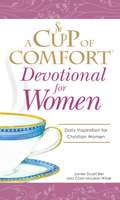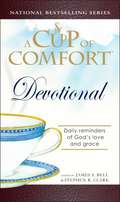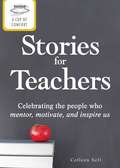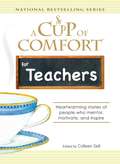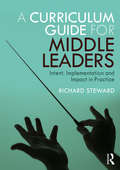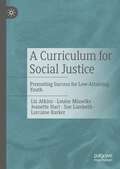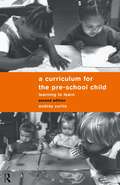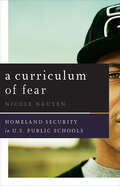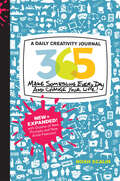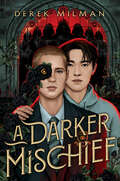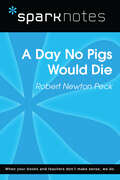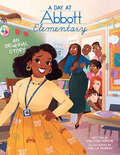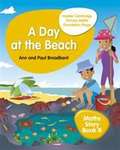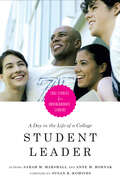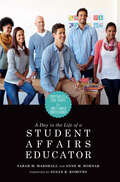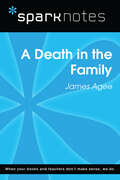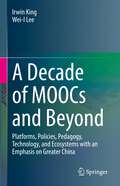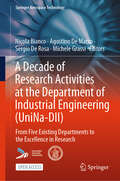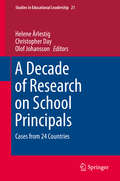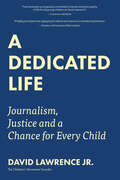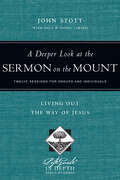- Table View
- List View
A Cup of Comfort Devotional for Women: A daily reminder of faith for Christian women by Christian Women (Cup of Comfort)
by James Stuart Bell Carol McLean WildeIn this special addition to the bestselling A Cup of Comfort series, more than 100 contributors extend a sisterly hand to help you stay on the path of Christian love and devotion every day of the year.You will cherish real-life heroines such as:Mimi, whose love for her daughter and trust in the Lord allows her to confront her greatest fearMaralee, whose kidney cancer is diagnosed on Valentine's Day and, by God's grace, is healed in time for her beloved son's wedding that JuneRenee, a substitute teacher who asks God to help her connect with a troubled student With a touching story for each month and biblical passages as well as accounts of women's real-life encounters with God for every day in the year, A Cup of Comfort Devotional for Women is a daily dose of grace and goodness for Christians everywhere.
A Cup of Comfort Devotional: Daily Reflections to Reaffirm Your Faith in God (Cup of Comfort)
by James Stuart Bell Stephen ClarkIn A Cup of Comfort Devotional 366 entries provide a daily dose of comfort, strength and inspiration. The perfect bedside companion to be read in the morning or evening, this magnificent work is the first of its kind to combine biblical passages and commentary with a dozen touching, heartfelt stories that have become the hallmark of A Cup of Comfort. Readers will cherish stories of Jesus entering into everyday life, such as: Ul>A young woman, traumatized during her first helicopter ride, says the Lord's Prayer and finds herself in awe as she looks down on God's creation; A woman finds out through a co-worker that Jesus can meet her right in the midst of her depression;A mother learns an unforgettable lesson of faith when a doll representing the baby Jesus in her outdoor nativity scene is stolen;With entries linked to the holidays and seasons, A Cup of Comfort Devotional brightens every day of the year, deepening our joys and sustaining us through the darker times.
A Cup of Comfort Stories for Teachers
by Colleen SellVirtually everyone can recall a special teacher, coach, or mentor who opened his or her eyes to a new outlook on life. Teachers guide us to read, write, imagine, explore, and understand; they teach us to count, and they teach us what counts in life. Teachers touch millions of young lives every day with their dedication, passion, and generosity. The three stories in A Cup of Comfort Stories for Teachers offer you a way to repay our devoted educators.
A Cup of Comfort Stories for Teachers: Celebrating the people who mentor, motivate, and inspire us
by Colleen SellVirtually everyone can recall a special teacher, coach, or mentor who opened his or her eyes to a new outlook on life. Teachers guide us to read, write, imagine, explore, and understand; they teach us to count, and they teach us what counts in life. Teachers touch millions of young lives every day with their dedication, passion, and generosity. The three stories in A Cup of Comfort Stories for Teachers offer you a way to repay our devoted educators.
A Cup of Comfort for Teachers: Heartwarming stories of people who mentor, motivate, and inspire (Cup of Comfort)
by Colleen Sell"It's the supreme art of the teacher to awaken joy in creative expression and knowledge." -Albert EinsteinEvery single day in countless classrooms all around the world, teachers inform young minds-and transform young lives. In this moving collection of true stories, you'll meet more than fifty remarkable people who've made a big difference in a struggling student's life-one hour, one lesson, one "good job!" at a time.In today's challenging world, being a good teacher is harder than ever-and encouragement may sometimes be hard to come by. But this unforgettable celebration of the trials and triumphs of the world's toughest profession is sure to delight and inspire you. Whether you're a teacher on the front lines or a student grateful for the dedication, passion, and generosity of a favorite mentor, A Cup of Comfort for Teachers is just what the principal ordered.
A Cup of Comfort® Stories for Teachers
by Colleen SellCelebrating the people who mentor, motivate, and inspire us
A Curriculum Guide for Middle Leaders: Intent, Implementation and Impact in Practice
by Richard StewardA Curriculum Guide for Middle Leaders is a comprehensive guide to the curriculum for middle leaders and subject leaders. Designed to support middle leaders in both primary and secondary schools, it explores every aspect of successful curriculum leadership beginning with intent and moving on to cover implementation and impact. It is closely aligned to the new inspection framework and demystifies key terminology including selection, sequencing, progression, and interleaving. Written in an accessible Q&A format, the book equips readers with the tools and the knowledge they need to construct an imaginative and effective subject curriculum, and prepares them to take part successfully in ‘deep dives’. There are also templates and practical tools drawn from good practice across the country that can be easily adapted for individual subjects and schools. Addressing the key concerns of both experienced leaders and those new to the role, this essential resource encourages readers to think deeply about the curriculum and how it is taught, enabling them to make a significant contribution to whole school improvement.
A Curriculum for Social Justice: Promoting Success for Low-Attaining Youth
by Liz Atkins Louise Misselke Jeanette Hart Sue Lambeth Lorraine BarkerThis book reports the outcomes of a research project which involved developing and implementing a research-informed curriculum for low-attaining further education students. Key aims of the curriculum were to ameliorate some of the social and educational disadvantages faced by the students, and to support secure and sustainable transitions to employment or further education. The book begins by outlining the characteristics of the lowest-attaining young people and considering the challenges they face. Subsequent chapters describe the educational and geographic contexts, the curriculum, and the pedagogical approaches adopted. It moves on to describe the outcomes of the project, drawing on narratives of individual students and staff to illustrate the benefits of a broader curriculum which acknowledges earlier disadvantage. The book concludes with a discussion of how the curriculum could be adapted in different contexts and considers the implications of such change in terms of policy, practice, future research and social justice.
A Curriculum for the Pre-School Child
by Audrey CurtisFirst published in 1986, this book has been enormously influential in the training and professional development of early years workers. This new edition has been fully revised to take account of changes in the National Curriculum, the publication of the government's 'desirable outcomes' statement for the under-fives, and the introduction of NVQ's in child care and education. The new edition also includes sections on:* the effects of developmental psychology on the early years curriculum* working with two-year-olds on self-awareness and social skills* developing communication, motor, analytical and problem solving skills* fostering aesthetic and creative awareness* play and the learning environment* record-keeping and assessment* involving parents* continuity from pre-schooling to statutory schooling.
A Curriculum of Fear: Homeland Security in U.S. Public Schools
by Nicole NguyenWelcome to Milton High School, where fear is a teacher&’s best tool and every student is a soldier in the war on terror. A struggling public school outside the nation&’s capital, Milton sat squarely at the center of two trends: growing fear of resurgent terrorism and mounting pressure to run schools as job training sites. In response, the school established a specialized Homeland Security program. A Curriculum of Fear takes us into Milton for a day-to-day look at how such a program works, what it means to students and staff, and what it says about the militarization of U.S. public schools and, more broadly, the state of public education in this country. Nicole Nguyen guides us through a curriculum of national security–themed classes, electives, and internships designed through public-private partnerships with major defense contractors like Northrop Grumman and federal agencies like the NSA. She introduces us to students in the process of becoming a corps of &“diverse workers&” for the national security industry, learning to be &“vigilant&” citizens; and she shows us the everyday realities of a program intended to improve the school, revitalize the community, and eliminate the achievement gap. With reference to critical work on school militarization, neoliberal school reform, the impact of the global war on terror on everyday life, and the political uses of fear, A Curriculum of Fear maps the contexts that gave rise to Milton&’s Homeland Security program and its popularity. Ultimately, as the first ethnography of such a program, the book provides a disturbing close encounter with the new normal imposed by the global war on terror—a school at once under siege and actively preparing for the siege itself.
A Daily Creativity Journal
by Noah ScalinThis inspiring journal featuring hundreds of project prompts will help you unlock your creativity with a year of daily artmaking!The concept of Noah Scalin’s “365 method” is simple but inspired: Choose a theme or medium, then make something with it every day for a year. Noah made 365 skull-themed projects . . . now he invites you to choose your obsession and get creative!A Daily Creative Journal offers 365 project prompts to kick start your creativity. It offers tips on how to choose your subject and document your work, plus examples from other artists and crafters who took the 365 challenge. It also introduces new techniques to incorporate into your projects, including quilling, clay-making, paper pop-up engineering, and more. With 365: A Daily Creativity Journal you’ll see how making something every day can change your creative process—and your life—forever!
A Darker Mischief
by Derek MilmanThe Honeys meets The Secret History in a work of dark academia like no other -- a boarding school thriller about a queer teen from Mississippi who finds himself swept into a world of old money, privilege, and the secret society at the heart of it all.When Cal Ware wins a scholarship to an elite New England boarding school, he's thrilled to leave his past behind. Back home in Mississippi, he was the poor, queer kid who never fit in. But at Essex Academy, he'll be able to reinvent himself. Or so he hopes...But at Essex, Cal's classmates only see his cheap clothes and old iPhone. They mock his accent, and can't believe he's never left the country, or heard of The Hamptons. Cal, at his breaking point, is about to give up and return to Mississippi when he learns about a secret society on campus -- the key to becoming Essex royalty.Cal knows he's not exactly secret society material, but to his surprise, he finds an unlikely champion in the handsome, charismatic, and slightly dangerous Luke Kim. As they get swept up in the mystery and glamour of the Rush process, Cal finds himself falling in love for the first time. But as the initiation rituals grow riskier -- and increasingly nefarious -- Cal must decide how far he's willing to go, and how much of himself he's willing to sacrifice, to save everything and everyone he cherishes most. Because nothing at Essex -- not even Cal's first love -- is quite what it seems.
A Day No Pigs Would Die (SparkNotes Literature Guide Series)
by SparkNotesA Day No Pigs Would Die (SparkNotes Literature Guide) by Robert Newton Peck Making the reading experience fun! Created by Harvard students for students everywhere, SparkNotes is a new breed of study guide: smarter, better, faster.Geared to what today's students need to know, SparkNotes provides:chapter-by-chapter analysis explanations of key themes, motifs, and symbols a review quiz and essay topics Lively and accessible, these guides are perfect for late-night studying and writing papers.
A Day at Abbott Elementary (Official Abbott Elementary Picture Book)
by Halcyon PersonThis official Abbott Elementary picture book features all your favorite characters and tells a hilarious and heartwarming new story not seen on the show!Abbott Elementary is ABC's hottest new comedy! This official picture book features an original adventure starring your favorite teachers and students from the show, including Janine, Ava, Gregory, Melissa, Barbara, Jacob, and Mr. Johnson.It's just a normal day at Abbott Elementary. That is, until Miss Teagues finds a squirrel hiding in her second-grade classroom! But the sneaky critter isn't the only problem. The squirrel has been hiding acorns in the walls -- and the nuts have caused a huge crack, which is spreading all over the school! Can the teachers work together to find the squirrel and its stash of acorns before it's too late?Featuring hilarious illustrations, heartwarming text, speech bubbles, and a diverse cast of characters, this picture book is perfect for Abbott Elementary fans of all ages -- and anyone who likes to laugh!
A Day at the Beach
by Ann and Paul BroadbentExplore, support and consolidate Early Years mathematics with a colourful, simple story for ages 4-5, containing key mathematical concepts and practice opportunities. Practise key mathematical concepts with simple question prompts on each page and activities at the end of the book. Support the maths themes covered in Activity Book B and the Teacher’s Pack. Books in the Hodder Cambridge Primary Maths series for the Foundation Stage: Activity Book A – 9781510431829 Activity Book B – 9781510431836 Activity Book C – 9781510431843 Story Book A The Stripy Sock – 9781510431850 Story Book B A Day at the Beach – 9781510431874 Story Book C The Surprise Party – 9781510431881 Teacher’s Pack – 9781510431867 HODDER EDUCATION e: education@bookpoint.co.uk w: hoddereducation.com
A Day at the Beach: A Grammar Tales Book to Support Grammar and Language Development in Children (Grammar Tales)
by Jessica HabibPete, Jem and Belle are enjoying a day at the beach until the weather turns stormy. Targeting Subject-Verb-Object sentences and early adjectives, this book provides repeated examples of early developing syntax and morphology which will engage and excite the reader while building pre-literacy skills and make learning fun, as well as exposing children to multiple models of the target grammar form. Perfect for a speech and language therapy session, this book is an ideal starting point for targeting client goals and can also be enjoyed at school or home to reinforce what has been taught in the therapy session.
A Day in the Life of a College Student Leader: Case Studies for Undergraduate Leaders
by Anne M. Hornak Sarah M. Marshall“Sarah Marshall and Anne Hornak have done a magnificent job exploring diverse contexts in which college students expand their individual leadership capacity and learn and practice engaging in relational leadership with others. These cases are realistic because they were gathered from their interviews with real students engaging in leadership. From whatever perspective, students can learn that they are doing leadership when they work with others to address shared issues, solve shared problems, and work toward positive change.”—from the Foreword by Susan R. KomivesThis book presents over 230 case studies that reflect typical issues faced by undergraduate student leaders. The scenarios cover the range of functional areas of student life.These cases are intended for use by faculty and student affairs professionals as training tools for new student leaders who generally receive little preparation before assuming their positions. Cases provide an opportunity for students to roleplay and discuss scenarios before they encounter potentially similar events in their daily lives as leaders; engage students intensely in their learning, as they work through the issues and problems; and promote meaningful dialogue and discussion of relevant theory.The cases are based on real life dilemmas, and reflect both contemporary and historical campus issues. They are derived from interviews with 110 undergraduates and 11 student affairs administrators from large public research institutions, small privates, community colleges, and mid-sized comprehensive schools.The book begins with guidance on how to use case studies effectively, and on how to incorporate theory in analyzing them. The cases are then grouped into chapters, each of which focuses on a particular type of student organization. The cases vary in length to allow for multiple uses. Shorter cases can be role played and discussed in leadership training workshops, while longer cases can be used as take home assignments or debated during longer training sessions. The book concludes with general advice for student leaders. To assist with the facilitation process, the authors provide discussion questions to begin the analysis of each case. The cases are written broadly enough to allow for a variety of possible solutions.
A Day in the Life of a Student Affairs Educator: Competencies and Case Studies for Early-Career Professionals
by Anne M. Hornak Sarah M. MarshallThis book constitutes a collection of case studies that explore issues faced by new professionals in student affairs, with the scenarios designed to develop ACPA/NASPA Professional Competencies. These cases provide opportunities to create meaningful learning experiences for courses, training programs, and the mentoring of new professionals, giving them exposure to the kinds of dilemmas they will encounter as they assume their leadership roles or start out on supervisory positions.The cases are derived from interviews with current student affairs professionals, are based on real life dilemmas, reflect contemporary issues on our college campuses, and are designed to be easily used or adapted across all institutional types.The cases cover the areas of advising and helping; assessment, evaluation and research; equity, diversity, and inclusion; ethical professional practice; history, values, and philosophy; human and organizational resources; law, policy, and governance; leadership; personal foundations; and student learning and development, and vary in length to allow for multiple uses. Shorter cases can be role-played and discussed in leadership training workshops, while longer cases can be used as take-home assignments or debated during longer training sessions. The book begins with advice on how to use the cases and concludes with general advice provided by current professionals in the field.
A Day with Splosh
by David MellingJoin Splosh on his busy day in this fun story from the bestselling creator of Hugless Douglas. Splosh has a busy day at Little School planned - there's all his fluffy duck friends to see, kites to fly and painting to be done. Will he be able to do everything?This adorable story will introduce the daily routine to the youngest of readers.
A Death in the Family (SparkNotes Literature Guide Series)
by SparkNotesA Death in the Family (SparkNotes Literature Guide) by James Agee Making the reading experience fun! Created by Harvard students for students everywhere, SparkNotes is a new breed of study guide: smarter, better, faster.Geared to what today's students need to know, SparkNotes provides:chapter-by-chapter analysis explanations of key themes, motifs, and symbols a review quiz and essay topics Lively and accessible, these guides are perfect for late-night studying and writing papers.
A Decade of MOOCs and Beyond: Platforms, Policies, Pedagogy, Technology, and Ecosystems with an Emphasis on Greater China
by Irwin King Wei-I LeeThis book is an academic publication about the global development of massive open online courses (MOOCs) and major MOOC platforms worldwide in the past decade, as well as the outlook of MOOCs in the future, with an emphasis on Greater China. The book also discusses the upsurge of the demand for online learning and MOOCs during the COVID-19 pandemic.The book is divided into three main parts - Part I: Overview of MOOCs introduces the origin and history of MOOCs and the development of MOOC platforms in Greater China and the global context; Part II: Key Issues discuss the MOOC policies, innovative pedagogy, technology, and ecosystems worldwide; and Part III: Beyond MOOCs probes into the roles and benefits of MOOCs in times of crises, as well as the outlook of MOOCs in the future. In terms of topic diversity, the book contains a comprehensive investigation of the past and latest MOOC developments, extracting and elaborating on relevant information regarding platforms, policies, pedagogy, technology, and ecosystems. Subsequently, in-depth analyses of MOOC data are utilized to deduce the current trends related to the MOOC movement and to extrapolate the likeliest direction of development for MOOCs in the years to come. The book can inform policymakers, education institutions, course instructors, platform developers, investors, researchers, and individual learners of MOOCs about critical information on the present and future of MOOC development, assisting them in making crucial decisions on what initiatives can optimize their advantages in the sector.
A Decade of Research Activities at the Department of Industrial Engineering: From Five Existing Departments to the Excellence in Research (Springer Aerospace Technology)
by Sergio De Rosa Nicola Bianco Agostino De Marco Michele GrassiThis open access book celebrates the decennial of the Department of Industrial Engineering of Università di Napoli Federico II, Italy. It covers the main research achievements developed at the department in the fields of aerospace, marine, energy, statistical, mechanical and management engineering. Five pre-existing departments merged in 2013, and the research results are here summarized to certify how important it was to join skills, expertise, and projects. The industrial engineering area is huge, but it is now dominated by the need to conceive and analyze new solutions, human and climate oriented to face with the actual challenges which dictate the new paradigm, which evolved from “is it feasible?” to “is it compatible with the environment and the human beings?”. There is still a lot to do, but the contents of this book demonstrate that the first steps have been done. All the researchers of the department have contributed to this book, more than 140 authors, and thus, it isthe collective outcome of the path they were able to perform all together, including administrative officers and technicians. It highlights the international relevance and multidisciplinarity of research at the university as well as the planned research lines for the next years.
A Decade of Research on School Principals: Cases from 24 Countries (Studies in Educational Leadership #21)
by Christopher Day Olof Johansson Helene ÄrlestigThis book provides a unique map of the focus and directions of contemporary research on school leadership since 2000 in 24 countries. Each of these directions has its own particular cultural, educational and policy history. Taken together, the various chapters in the volume provide a rich and varied mosaic of what is currently known and what is yet to be discovered about the roles and practices of principals, and their contributions to the improvement of teaching and the learning and achievement of students. The particular foci and methodological emphases of the research reported illustrate the different phases in the development of educational policies and provision in each country. This collection is an important addition to existing international research that has shown beyond any reasonable doubt that the influence of school principals is second only to that of teachers in their capacity to impact students' progress and achievement and to promote equity and social justice.
A Dedicated Life: Journalism, Justice and a Chance for Every Child
by David Lawrence Jr.In this inspiring memoir, &“an unfailing champion for all children . . . shares his ever- committed life story . . . What an example he is for all of us&” (Marian Wright Edelman, President of the Children&’s Defense Fund). After spending three decades in journalism as a newspaper reporter, editor and publisher, Dave Lawrence dedicated his life to a new mission: making sure every child has a real chance to succeed. A prominent advocate for children across the country, David helped found The Children&’s Movement of Florida, an organization that launched in 2010 with the purpose of making Florida&’s children, especially in their early years, the top priority for state investment. In A Dedicated Life, David tells his story from his time at the Detroit Free Press and the Miami Herald to his &“retirement&” at fifty-six, when he transitioned into his new calling and began making significant strides in Florida&’s pre-K programs, parent skill-building, and so much more. &“This special book is the story of a good man who has lived an impressive, fascinating, full life dedicated to his family, his profession, his faith and his service to others, especially the youngest and most vulnerable among us.&” —Jeb Bush, Florida&’s 43rd Governor &“[A] highly principled man applying his talents and values in a transitioning America.&” —Bob Graham, Florida&’s 38th Governor and former Senator
A Deeper Look at the Sermon on the Mount: Living Out the Way of Jesus (LifeGuide in Depth Series)
by John StottSermon on the MountSermon on the MountThe Message of the Sermon on the MountA Deeper Look at the Sermon on the Mounthow powerful meekness ishow you can influence the desolate places of society (hint: it has to do with character)how to experience God's law as delightfulhow to treat your enemies
